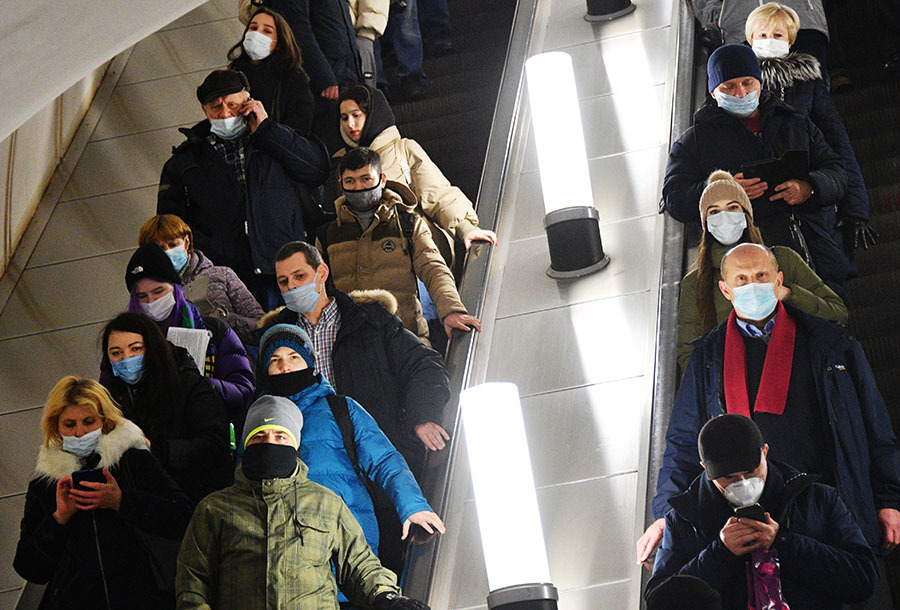According to the headquarters, over the past day, 14,207 new cases of coronavirus were detected in Russia.
During this time, 13,935 people recovered, 394 died from complications that developed against the background of COVID-19, and concomitant diseases.
Since the beginning of the pandemic, 4,086,090 confirmed COVID-19 diagnoses have been recorded in the country.
3 607 036 people recovered, 80 520 died.
The headquarters reports that there are currently 398,534 active cases of coronavirus in the Russian Federation.
According to Rospotrebnadzor, over 107.1 million tests for coronavirus were carried out over the entire observation period, including 299 thousand in the last 24 hours.
622,191 people remain under medical supervision.
The lowest COVID-19 growth rate in Russia over the past day was recorded in Tuva - 0.04%, the growth rate in Moscow is 0.2%.
During the day, 1,818 new cases of COVID-19 were detected in Moscow, 1,093 in St. Petersburg, and 801 in the Moscow region.
Infectious disease doctor, Professor Nikolai Malyshev suggested that a decrease in mortality from COVID-19 in Moscow can be expected in a few weeks.
Meanwhile, in St. Petersburg, the number of hospitalizations with coronavirus in a week has decreased by more than 20%.
This was announced by the head of the city health committee Dmitry Lisovets.
According to him, 2365 patients were hospitalized with COVID-19 and suspected of it last week.
“A week earlier this figure was 2959 patients.
Thus, the decrease in hospitalizations was more than 20%, ”he wrote on the social network VKontakte.
Lisovets noted that the city has begun the process of returning to the normal operation of hospitals for patients with coronavirus.
“Last week, the Mariinsky Hospital returned to the planned work, pavilion 7 of Lenexpo stopped working.
Today, part of the Children's Hospital No. 5 named after
Filatov, ”the official added.
The Moscow region authorities, in turn, reminded of the need to observe the mask regime.
Despite the improvement in the situation with the coronavirus in the region, it is too early to give up masks, said the governor of the Moscow region, Andrei Vorobyov.
“COVID-19 is receding.
Active vaccination is in progress.
And of course, this is yielding results.
We see a lot of work on folding beds.
All this instills optimism, "- the words of the governor are broadcast by the TV channel" 360 ".
RIA News
© Evgeny Biyatov
However, the presence of masks is still important, the governor said.
“For a person to protect himself, so that the older generation, those who for various reasons cannot be vaccinated, could protect themselves,” Vorobyov explained.
New strain identification and collaboration with WHO
Rospotrebnadzor announced the registration of the world's first test system for detecting the British strain of coronavirus.
“The new test system quickly detects the presence of a mutant strain, which is realized through a special selection of oligonucleotides for effective amplification of the“ British ”mutation, and is designed for a maximum virus concentration of 106 copies / ml,” the ministry said in a statement.
Rospotrebnadzor noted that this "allows you to avoid false positive results when detecting mutations for samples with a very high viral load."
The reagent kit has successfully passed all clinical trials, and its high accuracy has been proven during trials on clinical specimens with a confirmed mutation, Rospotrebnadzor added.
As noted in the department, the new technology can also be used to develop reagents to identify any other mutations of the coronavirus.
In addition, it became known that Rospotrebnadzor and the World Health Organization (WHO) will establish a WHO collaborating center for pandemic preparedness and training for rapid response teams.
The Office will support WHO in the creation and use of mobile laboratories, training of foreign specialists (primarily in Eastern Europe and Central Asia) and building a network of such institutions.
“The activities of the collaborating center will make a tangible contribution to building the capacity of the countries of the Eurasian region to combat infections with epidemic potential based on the most effective approaches used in the Russian Federation,” the department added.

